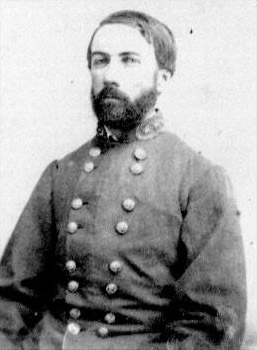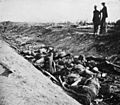Daniel Harvey Hill facts for kids
Quick facts for kids
Daniel Harvey Hill
|
|
|---|---|
 |
|
| Born | July 12, 1821 York District, South Carolina |
| Died | September 24, 1889 (aged 68) Charlotte, North Carolina |
| Place of Burial |
Davidson College Cemetery
|
| Allegiance | |
| Service/ |
|
| Years of service | 1842–49 (USA) 1861–65 (CSA) |
| Rank | |
| Commands held | Division command, Army of Northern Virginia; corps command, Army of Tennessee |
| Battles/wars | Mexican-American War |
| Other work |
|
Daniel Harvey Hill, often called D. H. Hill, was an important Confederate general during the American Civil War. He was born on July 12, 1821, and passed away on September 24, 1889. Before the Civil War, he was an officer in the Mexican–American War. He earned two special promotions for his bravery in that war.
After leaving the army, Hill became a teacher. When North Carolina left the Union, Hill joined the Confederate army. He quickly became a Major general by 1862. He served in the famous Army of Northern Virginia. Hill was known as a smart military leader. Even Lieutenant general Stonewall Jackson, who was his brother-in-law, thought he was a genius.
Contents
Early Life and Education
Daniel Harvey Hill was born on July 12, 1821. His family lived at Hill's Iron Works in York County, South Carolina. His grandfather, William Hill, was from Ireland. He built an iron factory that made cannons for the American army during the American Revolutionary War. His grandfather was also a soldier in that war.
Young Daniel went to school in his local area. In 1838, he was accepted into the United States Military Academy at West Point. This is a famous military school. He was in the same class as other future generals like James Longstreet and William Rosecruss. Four years later, he graduated 28th in his class of 56 students. He then became an officer in the 1st US Artillery.
Hero in the Mexican War
Hill fought in almost every major battle during the Mexican–American War. He quickly rose to the rank of First lieutenant. He earned special promotions for his brave actions. He became a Captain after the battles of Contreras and Churubusco. For his actions at the Battle of Chapultepec, he was promoted to major. The state of South Carolina even gave him a gold sword to thank him for his service.
Life as a Teacher
In 1849, Hill left the army. He decided to become a Professor of Mathematics at Washington College. This school is now known as Washington and Lee University. In 1854, he moved to Davidson College to teach there. By 1859, he became the superintendent of the North Carolina Military Institute. This showed his dedication to education.
Service in the Civil War
When the Civil War began, Hill quickly showed his leadership skills. As a Colonel of the 1st North Carolina Infantry, he led his troops to victory in the Battle of Big Bethel in 1861. By the next year, he was promoted to Major general in the Army of Northern Virginia.
He led his division in many important battles. These included Yorktown, Williamsburg, Seven Pines, and the Seven Days Battles. During the Seven Days Battles, Hill advised his commander, Robert E. Lee, not to attack Union forces at the Battle of Malvern Hill. He believed the Union army was too strong there. Lee did not follow his advice, and the attacks failed.
Hill stayed behind to defend Richmond, Virginia, while Lee fought in the Northern Virginia Campaign. While in Richmond, Hill worked with Union general John Adams Dix. They created a system to exchange prisoners of war. This helped many soldiers.
The Lost Order
Hill rejoined Lee for the Maryland Campaign. During this time, a very important event happened. Hill was accidentally sent two copies of a secret plan called Special Order 191. One of these copies, known as the "lost copy," was found by a Union soldier on September 13. This soldier quickly sent it to Union general George B. McClellan.
Now, McClellan knew all of Lee's plans. He knew how Lee had divided his army and where each part was supposed to be. McClellan acted quickly and attacked Lee's forces. Hill's men, even though they were outnumbered, fought bravely at the Battle of South Mountain. They delayed the Union advance long enough for Lee to regroup his army.
Three days later, Hill's division defended a place called "Bloody Lane" at the Battle of Antietam. They faced many Union attacks but were eventually pushed back. Hill's division also fought in the Battle of Fredericksburg.
Later Commands
In the spring of 1863, Hill was sent to help defend North Carolina and Southern Virginia. He never returned to Lee’s main army. After helping defend Richmond during Lee’s Gettysburg Campaign, Hill was sent west. He commanded a Corps under Lieutenant general Braxton Bragg in the Army of Tennessee.
Hill led his corps to victory at the Battle of Chickamauga. However, he and General Bragg did not get along well. Because of this, Hill was left without a command and his promotion to lieutenant general was stopped. He did not command troops again until the very end of the war at the Battle of Bentonville.
Personality and Leadership
Daniel Harvey Hill was known as a very good combat leader. However, he sometimes had trouble getting along with other Confederate generals. People said he could be sarcastic, sudden, and sometimes even insulting. James Longstreet, another general, once joked that Hill's problem was being a North Carolinian in an army mostly made up of Virginians.
After the War
After the Civil War ended, D. H. Hill became an editor. He ran a magazine in Charlotte called "The Land We Love." From 1877 to 1880, he was the president of the Arkansas Industrial University. This school is now known as the University of Arkansas.
After that, he became president of the Middle Georgia Military and Agricultural College. Today, this school is called Georgia Military College. He stayed there until August 1889, when he had to resign because of poor health. He passed away in Charlotte on September 23, 1889. Daniel Harvey Hill was buried at the Davidson College Cemetery.
Images for kids
See also
 In Spanish: Daniel Harvey Hill para niños
In Spanish: Daniel Harvey Hill para niños
 | Bessie Coleman |
 | Spann Watson |
 | Jill E. Brown |
 | Sherman W. White |


